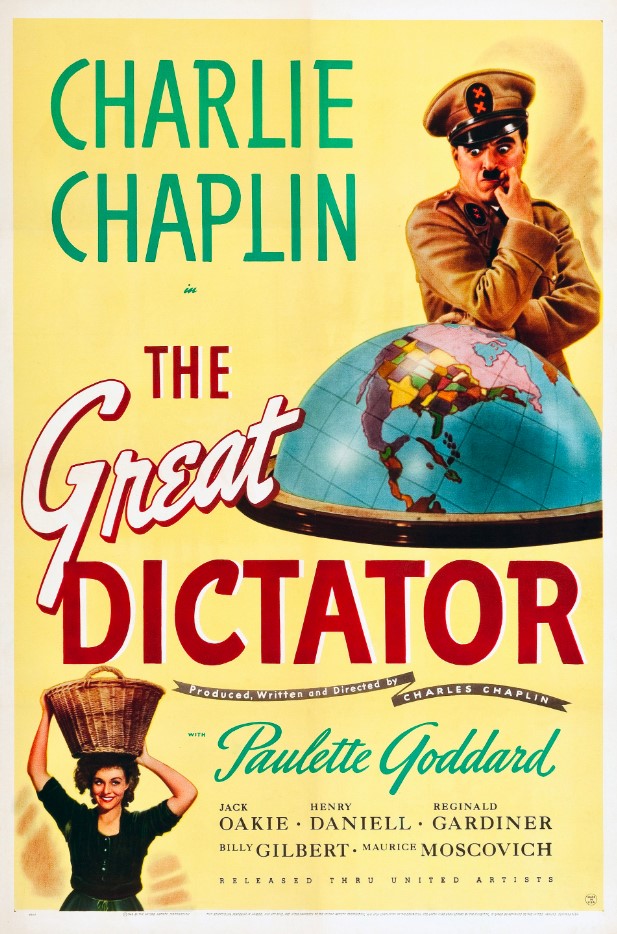The Great Dictator
Introduction
The Great Dictator is Charlie Chaplin’s first sound film, a daring satirical comedy that critiques fascism and tyranny. Chaplin plays both a ruthless dictator and a humble barber, delivering a powerful message through humor.
Sinopsis
In the fictional country of Tomainia, Adenoid Hynkel rises to power as a ruthless dictator, closely mirroring the real-life figure of Adolf Hitler. Hynkel’s regime is characterized by oppression and anti-Semitic policies, aiming for world domination. Meanwhile, a humble Jewish barber, who bears a striking resemblance to Hynkel, suffers under the regime’s brutalities.
The barber, having lost his memory during World War I, returns to his home in the ghetto, unaware of the current political climate. He befriends Hannah, a kind-hearted woman, and together they face the increasing persecution of Jews. As Hynkel’s power grows, the barber’s resemblance to the dictator leads to a case of mistaken identity that changes the course of events.
Hynkel’s plans for conquest and persecution escalate, culminating in a grand rally where he seeks to consolidate his power. However, the barber is mistakenly taken to deliver a speech in place of Hynkel. In a dramatic and unexpected turn, the barber addresses the crowd, delivering a heartfelt plea for peace, humanity, and compassion.
The barber’s speech, filled with hope and a call for unity, contrasts sharply with Hynkel’s message of hatred and division. The film concludes with this powerful oration, leaving the audience with a sense of optimism and a reminder of the enduring strength of the human spirit.
- Taglines: “The greatest, most tragic satire of all time!”
- Genres: Comedy, Drama, War
- Duration: 125 minutes
- Year: 1940
- Rated: Not Rated
- Metascore: 87

Interesting Facts
- The film was released in 1940, during the early years of World War II, making it a bold political statement at the time.
- Charlie Chaplin wrote, directed, produced, and starred in the film, showcasing his multifaceted talents.
- Chaplin’s speech at the end of the film is considered one of the most powerful and enduring moments in cinema history.
- The film marked the first time Chaplin spoke on screen, moving from his silent film roots to sound cinema.
Behind the Scenes
Charlie Chaplin was inspired to make The Great Dictator after seeing the rise of fascism in Europe and recognizing his own resemblance to Adolf Hitler. Despite the film’s serious themes, Chaplin infused his trademark humor and slapstick comedy into the narrative. The production faced numerous challenges, including political pressure and the controversial nature of its content. Chaplin’s commitment to delivering a powerful message about humanity and the dangers of dictatorship resulted in a film that remains relevant and impactful today.
Awards
The Great Dictator received five Academy Award nominations, including Best Picture, Best Actor (Charlie Chaplin), Best Original Screenplay, Best Supporting Actor (Jack Oakie), and Best Original Score. Although it did not win in any category, the film’s critical acclaim and lasting legacy affirm its significance in film history.
What Makes the Film Great?
The Great Dictator is celebrated for its bold political commentary, masterful blend of humor and drama, and Charlie Chaplin’s compelling dual performance. The film’s climactic speech delivers a timeless message of peace and humanity, making it a powerful piece of cinema that continues to resonate with audiences.
Director
Charlie Chaplin is one of the most iconic figures in film history, known for his work in silent cinema with classics like City Lights and Modern Times. The Great Dictator marked his transition to sound films and showcased his ability to address serious social issues through his unique comedic style.
Cast
- Charlie Chaplin: Adenoid Hynkel / The Barber
- Paulette Goddard: Hannah
- Jack Oakie: Benzino Napaloni
- Reginald Gardiner: Schultz
- Henry Daniell: Garbitsch
